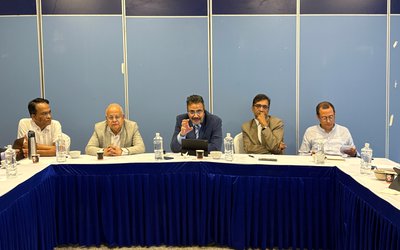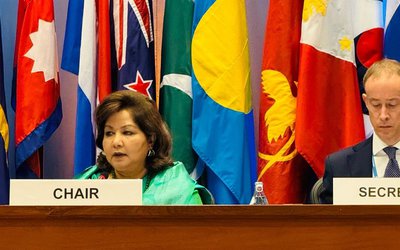More on National






At a time when Nepali Congress is celebrating the National Reconciliation Day, hailing the role played by late B.P. Koirala, CPN-UML leader Bharat Mohan Adhikari, an admirer of late Koirala as a great leader, however, sees his national reconciliation policy was a surrender before the King. Adhikari spoke to New Spotlight on the issue. Excerpts:
How do you view the role played by Nepali Congress leader late B.P. Koirala after his return from eight years’ exile in India?
There is no doubt that Congress leader B.P. Koirala was a great leader of this country. So far as Koirala’s national reconciliation policy is concerned, I have many observations. First of all, the policy was surrender to monarchy. B.P. Koirala came from India after facing humiliation there and he proposed national reconciliation to get concessions from the king.
Do you mean it was B.P. Koirala’s compulsion to propose national reconciliation to return to the country?
B.P returned after facing humiliation in India due to the State of Emergency. Yes, it was B.P. Koirala’s compulsion to come back to Nepal. For his sudden and prolonged arrest, B.P. urged compromise with the king and discarded progressive forces of the country. All of us saw that Koirala, who launched armed insurrection against king, came to Nepal seeking peaceful solution with monarchy and regressive forces.
Nepali Congress leaders have been saying that B.P wanted reconciliation among various political forces to restore democracy in Nepal. How do you look at this?
I don’t agree with this. Had Nepali Congress leader B.P. Koirala been alive, Nepal would not have got the democracy in 1990. Because B.P. declined to form a joint front with the Communist Party, we had lost a great chance to restore democracy in 1979. Our leader late Man Mohan Adhikari proposed for a joint movement, but B.P. rejected it.
Do you say B.P.’s national reconciliation policy was against democracy?
I don’t want to comment on it. After the death of B.P. Koirala, Nepali Congress joined hands with communists and formed a joint front against Panchayat. Because of this stand taken by Ganeshman Singh, we were able to overthrow the Panchayat system. Similarly, the alliance of seven parties and Maoists brought a historical change turning Nepal into a federal democratic republic. B.P.’s national reconciliation opposed such kinds of alliance.
How do you evaluate B.P.’s national reconciliation as a policy?
B.P. Koirala’s national reconciliation is anti-progressive. Although B.P. claimed that the aim of his national reconciliation was to defend the democracy and nationalism, both the components were much weaker during the period. In terms of politics, I appreciate G.P. Koirala’s role as he championed the cause of democracy and nationalism.
If B.P.’s main ideology of national reconciliation is irrelevant, why do you think has Nepali Congress been celebrating the day?
I told you that B.P. Koirala is a great political leader of Nepal and suffered a lot in the cause of democracy. If Nepali Congress celebrates it to take democracy to grassroots, there is nothing wrong with it. I think the national reconciliation was reinterpreted by G.P. Koirala, who joined hands with progressive forces to abolish monarchy.








